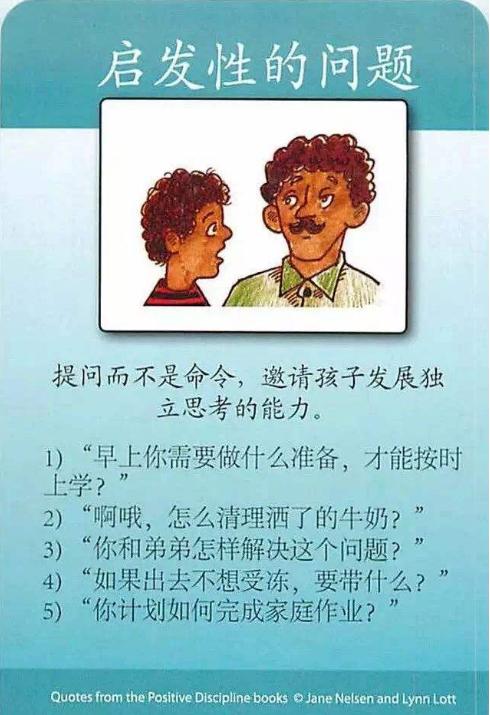Imagine one day, your daughter, who is about to graduate from high school, tells you that she plans to get drunk at a class reunion.
Parents are accustomed to giving orders to their children instead of asking questions.
These two ways give children completely different feelings and roles.

Imagine you go back to your childhood, you're still a child, and your parents say to you:
Hurry up and brush your teeth.
Don't do your homework yet,
Don't fight with your sister anymore.
Set the alarm and don't oversleep again.
After you all listened, how did you feel and what thoughts did you have? And then what would you do?
Let's listen to the next set:
How do we need to protect our teeth?
How did you arrange today's assignment?
How are you going to solve this problem?
Is there anything you can do to make sure you get up on time tomorrow morning?
After listening, compared to the previous group, how do you feel, what do you think, and then what will you do?
If you use heuristic questions instead of asking and preaching, you can achieve the effect of making children more involved and better understood, creating a more encouraging and respectful atmosphere.
Heuristic questions can also help children explore the consequences of their choices, which are very different from imposing the consequences on the child.
There is a good example in the book:
When my daughter told me that she was going to get drunk at a party, I said, "Tell me, why do you want to do that?" ”
"A lot of kids do that, and they look like they're happy when they're drunk," the daughter said. ”
I resisted the urge to teach her and asked, "You don't drink now, what do your friends think of you?"
The daughter thought about it and said, "They always say how much they admire me and are proud that I don't have this habit." ”
I went on to say, "What do they think they think or say when you think you're drunk?" ”
The daughter thought about it and said, "I'm sure they'll be disappointed." ”
I went on to say, "Then what do you think of yourself?" ”
The question made her daughter think harder, and she paused, "I'm probably going to think I'm a loser." ”
The daughter then added, "I don't think I'm going to do that." ”
The parent uses heuristic questions to help her daughter explore the consequences of her choices, but instead preaches or imposes a punitive consequence, as most parents do.
Imagine one day your daughter telling you that she was going to get drunk at a party, what would you say?
It's likely to be, "Is it good to be drunk?" Your friends will be disappointed in you, we will be so disappointed in you that we will feel like a loser afterwards. ”
So how do you think your daughter will get back to you? And what will be done?
Heuristic questioning can guide children to think about problems actively, think things clearly on their own, and determine what is important to them and what they want.
Imposing consequences on children often leads to rebellion and wariness in children, rather than exploratory thinking.
When using heuristic questions, there are several principles to note:
1. If you and anyone in your child are upset, you can't ask questions.
At this point, you can choose to "actively pause", and only if both parties can guarantee rationality, it is appropriate to use "heuristic problems" to solve the problem.
2. Don't preset the answer
Heuristic questions are used to understand what children really think, to help children learn to analyze problems and explore solutions.
Therefore, when we ask questions, do not preset the answer, do not lead the child to the preset result, and do not think of the purpose of control by asking questions.
3) The heuristic questions you ask should come from your heart
I don't quite understand what the author's true intention is about.
I think it may be your question to start from your inner love for the child, not from your mind's judgment of the child's behavior.
Welcome friends with different understandings, leave a message to discuss and communicate together.